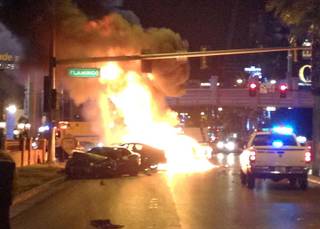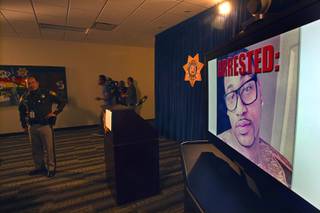
Metro Police
Ammar Harris
Thursday, March 14, 2013 | 2 a.m.
Related stories
- Suspect in Las Vegas Strip shootings brags online about fast life (2-27-2013)
- Cab companies offer $35,000 reward for suspect’s arrest (2-26-2013)
- Police ‘confident’ suspect was lone gunman in Thursday’s Strip shooting (2-25-2013)
- 'He could always make me smile': Slain taxi driver leaves void at Desert Cab (2-23-2013)
- Family of Kenneth Cherry Jr. reeling after son killed on Strip (2-23-2013)
- Suspects in Strip shooting still at large; taxi passenger identified (2-22-2013)
- The reaction: Tourists try to make sense of the violence on the Strip (2-21-2013)
- Will Strip shootout and crash hurt Las Vegas tourism? (2-21-2013)
If all goes according to prosecutors’ plans, the man police say is responsible for the deaths of three people last month after a shooting on the Las Vegas Strip will be returned to Nevada from a California jail, possibly as early as Thursday afternoon.
Ammar Harris, the man who Metro Police say opened fire from a moving car on the Strip on Feb. 21, killing another driver and causing a car crash that killed two more people, is scheduled to appear at 8:30 a.m. Thursday in Los Angeles County Superior Court for an extradition hearing.
Harris, 26, was arrested a week after the shooting at an apartment complex in Studio City, Calif. The Clark County District Attorney’s Office has charged him with three counts of murder and one count of attempted murder, plus counts of discharging a firearm into a vehicle and discharging a firearm out of a vehicle. Harris has remained in the Los Angeles County Jail without bond since his Feb. 28 arrest.
At a March 4 extradition hearing, Harris’ public defender asked for and was granted an identity hearing, in which the authorities have to prove they have arrested the right man.
“Basically, it’s a hearing to make sure all the papers are correct and this really is the individual they are looking for and no mistakes have been made,” said Chris Blakesley, a UNLV law professor and criminal law expert. “To prove they have the right person it will be similar to establishing probable cause for an arrest.”
In court Thursday, California authorities, most likely with assistance from Las Vegas authorities, presumably will present evidence showing Harris was involved in the Strip shooting and how he was identified, Blakesley said. For example, they may call a witness or present video and photographic evidence.
The identity hearing is due process protection for suspects to ensure authorities have not subjected the wrong person to arrest and extradition. Asking for the hearing can also be a strategic move for defendants.
“Internationally, they will typically challenge extradition, but domestically, between states, I think it’s fairly rare unless it’s clearly the wrong person. Sometimes they oppose extradition because they want some delay,” Blakesley said. “That way they can find a lawyer in the state where the crime was committed and get that lawyer going.”
If extradition is granted, Harris could appeal, further delaying any criminal proceedings, Las Vegas criminal defense attorney Patricia Erickson said.
Joel Mann, a Las Vegas criminal defense attorney, said several factors could lead to further delays: improperly filed paperwork or if there were outstanding charges in the state where the suspect was arrested that the suspect had yet to face, for example.
To execute an extradition from California, in most cases, a warrant must be issued from the governor’s office. If the demand does not specify the exact charges or violation that allegedly occurred, or the governor's warrant does not include the complaint and affidavit, a defense attorney may be able to get his client freed from jail.
Given the publicity the Strip shooting has received and the high-profile nature of the case, Metro Police and the Clark County District Attorney most likely combed over their documentation to make sure it was in order, Blakesley said.
“My instinct is that in a case like this, it is pretty solidly set up and all their ducks are in a row,” he said, noting the worst outcome for authorities would be to have the suspect released because they were not prepared to prove identity and probable cause for extradition. Such an outcome would give the suspect a second chance to flee.
It is possible for the attorney in the state where the suspect was arrested, perhaps in conjunction with an attorney in the requesting state, to work with the prosecution in the requesting state to resolve the charges without extradition. However, that is highly unlikely in this case, criminal attorneys said.
Despite the procedural delays and appeals — and barring a major error by police or prosecutors — extradition is all but inevitable, the attorneys said.
Once the court determines the correct person is in custody, in California the defendant can be held for up to 30 days so an agent from the requesting state can carry out the extradition.
Mann said he has represented clients who were extradited between states and transported using a private company that would visit several states in a single trip. Delivering a suspect to the proper destination in this manner could take days, or even weeks. But this method is used only with “normal” suspects, he said.
None of the lawyers contacted for this story thought this would be the case for such a high-profile suspect such as Harris. Authorities, they speculate, would expedite his return, which could come as early as Thursday afternoon.
“In this case, given the magnitude, I’d suspect that homicide detectives will go get him,” Erickson said. “There are private companies that move inmates, but then you are on the company’s timetable and it can take awhile. I bet they want him back here as soon as possible.”



Join the Discussion:
Check this out for a full explanation of our conversion to the LiveFyre commenting system and instructions on how to sign up for an account.
Full comments policy